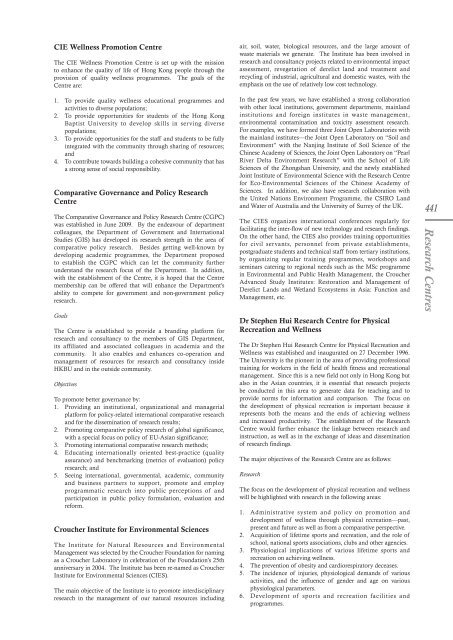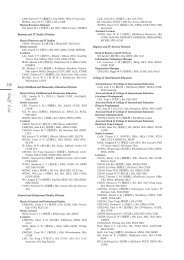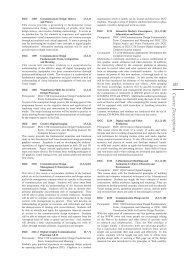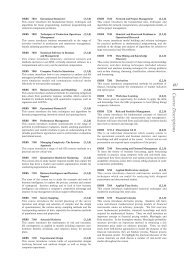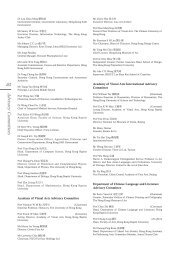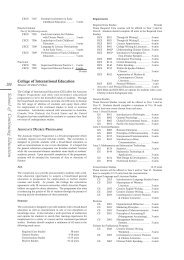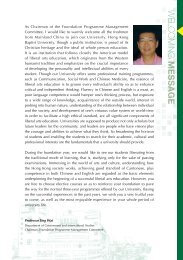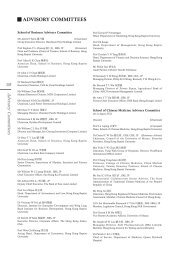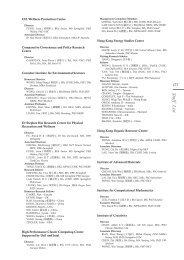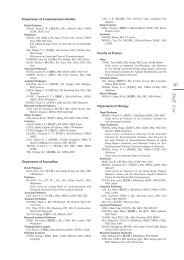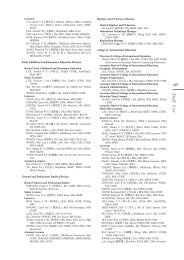Research Centres - Hong Kong Baptist University - Academic ...
Research Centres - Hong Kong Baptist University - Academic ...
Research Centres - Hong Kong Baptist University - Academic ...
You also want an ePaper? Increase the reach of your titles
YUMPU automatically turns print PDFs into web optimized ePapers that Google loves.
CIE Wellness Promotion Centre<br />
The CIE Wellness Promotion Centre is set up with the mission<br />
to enhance the quality of life of <strong>Hong</strong> <strong>Kong</strong> people through the<br />
provision of quality wellness programmes. The goals of the<br />
Centre are:<br />
1. To provide quality wellness educational programmes and<br />
activities to diverse populations;<br />
2. To provide opportunities for students of the <strong>Hong</strong> <strong>Kong</strong><br />
<strong>Baptist</strong> <strong>University</strong> to develop skills in serving diverse<br />
populations;<br />
3. To provide opportunities for the staff and students to be fully<br />
integrated with the community through sharing of resources;<br />
and<br />
4. To contribute towards building a cohesive community that has<br />
a strong sense of social responsibility.<br />
Comparative Governance and Policy <strong>Research</strong><br />
Centre<br />
The Comparative Governance and Policy <strong>Research</strong> Centre (CGPC)<br />
was established in June 2009. By the endeavour of department<br />
colleagues, the Department of Government and International<br />
Studies (GIS) has developed its research strength in the area of<br />
comparative policy research. Besides getting well-known by<br />
developing academic programmes, the Department proposed<br />
to establish the CGPC which can let the community further<br />
understand the research focus of the Department. In addition,<br />
with the establishment of the Centre, it is hoped that the Centre<br />
membership can be offered that will enhance the Department's<br />
ability to compete for government and non-government policy<br />
research.<br />
Goals<br />
The Centre is established to provide a branding platform for<br />
research and consultancy to the members of GIS Department,<br />
its affiliated and associated colleagues in academia and the<br />
community. It also enables and enhances co-operation and<br />
management of resources for research and consultancy inside<br />
HKBU and in the outside community.<br />
Objectives<br />
To promote better governance by:<br />
1. Providing an institutional, organizational and managerial<br />
platform for policy-related international comparative research<br />
and for the dissemination of research results;<br />
2. Promoting comparative policy research of global significance,<br />
with a special focus on policy of EU-Asian significance;<br />
3. Promoting international comparative research methods;<br />
4. Educating internationally oriented best-practice (quality<br />
assurance) and benchmarking (metrics of evaluation) policy<br />
research; and<br />
5. Seeing international, governmental, academic, community<br />
and business partners to support, promote and employ<br />
programmatic research into public perceptions of and<br />
participation in public policy formulation, evaluation and<br />
reform.<br />
Croucher Institute for Environmental Sciences<br />
The Institute for Natural Resources and Environmental<br />
Management was selected by the Croucher Foundation for naming<br />
as a Croucher Laboratory in celebration of the Foundation’s 25th<br />
anniversary in 2004. The Institute has been re-named as Croucher<br />
Institute for Environmental Sciences (CIES).<br />
The main objective of the Institute is to promote interdisciplinary<br />
research in the management of our natural resources including<br />
air, soil, water, biological resources, and the large amount of<br />
waste materials we generate. The Institute has been involved in<br />
research and consultancy projects related to environmental impact<br />
assessment, revegetation of derelict land and treatment and<br />
recycling of industrial, agricultural and domestic wastes, with the<br />
emphasis on the use of relatively low cost technology.<br />
In the past few years, we have established a strong collaboration<br />
with other local institutions, government departments, mainland<br />
institutions and foreign institutes in waste management,<br />
environmental contamination and toxicity assessment research.<br />
For examples, we have formed three Joint Open Laboratories with<br />
the mainland institutes—the Joint Open Laboratory on “Soil and<br />
Environment” with the Nanjing Institute of Soil Science of the<br />
Chinese Academy of Sciences, the Joint Open Laboratory on “Pearl<br />
River Delta Environment <strong>Research</strong>” with the School of Life<br />
Sciences of the Zhongshan <strong>University</strong>, and the newly established<br />
Joint Institute of Environmental Science with the <strong>Research</strong> Centre<br />
for Eco-Environmental Sciences of the Chinese Academy of<br />
Sciences. In addition, we also have research collaboration with<br />
the United Nations Environment Programme, the CSIRO Land<br />
and Water of Australia and the <strong>University</strong> of Surrey of the UK.<br />
The CIES organizes international conferences regularly for<br />
facilitating the inter-flow of new technology and research findings.<br />
On the other hand, the CIES also provides training opportunities<br />
for civil servants, personnel from private establishments,<br />
postgraduate students and technical staff from tertiary institutions,<br />
by organizing regular training programmes, workshops and<br />
seminars catering to regional needs such as the MSc programme<br />
in Environmental and Public Health Management, the Croucher<br />
Advanced Study Institutes: Restoration and Management of<br />
Derelict Lands and Wetland Ecosystems in Asia: Function and<br />
Management, etc.<br />
Dr Stephen Hui <strong>Research</strong> Centre for Physical<br />
Recreation and Wellness<br />
The Dr Stephen Hui <strong>Research</strong> Centre for Physical Recreation and<br />
Wellness was established and inaugurated on 27 December 1996.<br />
The <strong>University</strong> is the pioneer in the area of providing professional<br />
training for workers in the field of health fitness and recreational<br />
management. Since this is a new field not only in <strong>Hong</strong> <strong>Kong</strong> but<br />
also in the Asian countries, it is essential that research projects<br />
be conducted in this area to generate data for teaching and to<br />
provide norms for information and comparison. The focus on<br />
the development of physical recreation is important because it<br />
represents both the means and the ends of achieving wellness<br />
and increased productivity. The establishment of the <strong>Research</strong><br />
Centre would further enhance the linkage between research and<br />
instruction, as well as in the exchange of ideas and dissemination<br />
of research findings.<br />
The major objectives of the <strong>Research</strong> Centre are as follows:<br />
<strong>Research</strong><br />
The focus on the development of physical recreation and wellness<br />
will be highlighted with research in the following areas:<br />
1. Administrative system and policy on promotion and<br />
development of wellness through physical recreation—past,<br />
present and future as well as from a comparative perspective.<br />
2. Acquisition of lifetime sports and recreation, and the role of<br />
school, national sports associations, clubs and other agencies.<br />
3. Physiological implications of various lifetime sports and<br />
recreation on achieving wellness.<br />
4. The prevention of obesity and cardiorespiratory deceases.<br />
5. The incidence of injuries, physiological demands of various<br />
activities, and the influence of gender and age on various<br />
physiological parameters.<br />
6. Development of sports and recreation facilities and<br />
programmes.<br />
441<br />
<strong>Research</strong> <strong>Centres</strong>
442<br />
<strong>Research</strong> <strong>Centres</strong><br />
<strong>Academic</strong> Programmes<br />
An international conference will be held biennially to promote the<br />
awareness of the important of physical recreation and wellness.<br />
At the same time, it would also provide opportunities for exchange<br />
of ideas and interaction with overseas experts in this area. A<br />
referred edited book will be published on a biennial basis.<br />
A journal is published biannually to disseminate information in<br />
this area and made available to local scholars free of charge.<br />
A certificate course entitled Professional Certificate in Fitness<br />
Instruction is jointly organized by the Centre and the School of<br />
Continuing Education.<br />
Professional Services<br />
The Centre can also provide professional consultation on specific<br />
projects if requested.<br />
High Performance Cluster Computing Centre<br />
The High Performance Cluster Computing Centre (HPCCC) at<br />
the <strong>Hong</strong> <strong>Kong</strong> <strong>Baptist</strong> <strong>University</strong> was established in 2003 with<br />
the acquisition of a 64 node dual CPU PC cluster funded by<br />
the UGC under a teaching development grant. Its purpose is to<br />
provide a learning and research facility for students from various<br />
academic disciplines within and outside the <strong>Hong</strong> <strong>Kong</strong> <strong>Baptist</strong><br />
<strong>University</strong> in the area of parallel/distributed computing. In May<br />
2009, HPCCC acquired a PowerEdge M600 Cluster through<br />
a UGC Special Equipment Grant. This facility is currently<br />
the fastest machine in <strong>Hong</strong> <strong>Kong</strong> and ranked 486 on the June<br />
2009 release of the TOP500 list of supercomputers worldwide.<br />
As a result, HPCCC is in a very good position to support high<br />
performance computation in various academic disciplines in the<br />
territory.<br />
Over the years, the Centre has assisted a number of teaching<br />
and research programmes and conducted workshops to promote<br />
cluster computing in <strong>Hong</strong> <strong>Kong</strong>. Tutorials are given on regular<br />
basis to introduce beginners to cluster computing. An updated<br />
list of software and weblinks to online resources is maintained.<br />
The management team and technical staff have maintained good<br />
working relations with vendors, the grid computing community<br />
in <strong>Hong</strong> <strong>Kong</strong> and the neighboring Guangdong province to<br />
stay abreast of the latest developments, acquired the expertise<br />
and experience for hardware and software maintenance, and<br />
implemented an efficient user-support system. More details can<br />
be found at HPCCC’s website http://www.sci.hkbu.edu.hk/<br />
hpccc/.<br />
With the continuing expansion of the tertiary education system in<br />
<strong>Hong</strong> <strong>Kong</strong> and the drive towards cutting-edge research in novel<br />
functional materials, nanotechnology, information technology and<br />
various interdisciplinary fields, the demand for high performance<br />
computing facilities can only become greater. HPCCC will<br />
continue to strive to excel in its unique role to support academics<br />
and students in their day-to-day teaching and research activities,<br />
to promote cluster computation in <strong>Hong</strong> <strong>Kong</strong> through workshops<br />
and conferences, and to foster interdisciplinary, institutional,<br />
and international collaboration in the area of high-performance<br />
computation.<br />
HKBU–UIC Joint Institute of <strong>Research</strong> Studies<br />
The HKBU–UIC Joint Institute of <strong>Research</strong> Studies (JIRS) was<br />
established jointly by the <strong>Hong</strong> <strong>Kong</strong> <strong>Baptist</strong> <strong>University</strong> and<br />
the Beijing Normal <strong>University</strong>–<strong>Hong</strong> <strong>Kong</strong> <strong>Baptist</strong> <strong>University</strong><br />
United International College (UIC) in July 2008. It aims to<br />
create research and postgraduate training opportunities for both<br />
institutions, through which they can complement one another in<br />
research and development. Specifically, JIRS aims to facilitate<br />
and enhance co-operation and collaboration in graduate studies,<br />
research and development between (1) HKBU and UIC, and (2)<br />
JIRS and research institutes in mainland China and overseas.<br />
<strong>Research</strong> Postgraduate Programmes<br />
JIRS is responsible for managing the MPhil and PhD programmes<br />
of HKBU in UIC. <strong>Academic</strong> staff of HKBU and UIC who are<br />
appointed as JIRS Fellows could be the principal supervisor(s) or<br />
co-supervisor(s) of the MPhil and PhD students stationed at UIC.<br />
The research degrees are awarded by HKBU.<br />
Taught Postgraduate Programmes<br />
JIRS is also responsible for managing the taught postgraduate<br />
degrees programmes offered by HKBU at UIC or jointly by<br />
HKBU and UIC (including those jointly offered by HKBU/UIC/<br />
HKBU-UIC and other research institutes in mainland China or<br />
overseas).<br />
Other Activities<br />
JIRS also provides post-doctoral posts for HKBU and UIC. It<br />
endeavours to initiate, host, organize and manage academic<br />
conferences, seminars and meetings for HKBU, UIC or any other<br />
research institutes of international repute. Consultancy work<br />
for external organizations and commissioned work on approved<br />
projects will be carried out.<br />
For more information, please visit the following web site at<br />
http://uic.edu.hk/jirs.<br />
<strong>Hong</strong> <strong>Kong</strong> Energy Studies Centre<br />
Energy is an important issue in the contemporary world. Energy<br />
demand and supply, pricing, trade, consumption, conservation<br />
and pollution problems are highly relevant and significant topics<br />
in any modern society.<br />
Energy problems impinge upon quite a few disciplines. Their<br />
resolution calls for the cooperation of experts from various fields<br />
like economics, politics, geography, engineering, architecture,<br />
planning, environmental studies and the natural sciences.<br />
Objectives<br />
The <strong>Hong</strong> <strong>Kong</strong> Energy Studies Centre at <strong>Baptist</strong> <strong>University</strong> aims<br />
at playing a coordinating role in linking up energy specialists and<br />
interested parties from the various disciplines among the tertiary<br />
institutes and other firms or organizations in tackling energy<br />
issues, with particular emphasis on <strong>Hong</strong> <strong>Kong</strong> and Chinese<br />
energy.<br />
<strong>Research</strong><br />
Specifically, the Centre will focus on the following tasks:<br />
1. To carry out joint research projects with energy specialists.<br />
2. To hold seminars, workshops and conferences on energy.<br />
3. To formulate and execute policy studies on energy issues<br />
with a view to presenting the results to the relevant bodies or<br />
authorities.<br />
4. To disseminate knowledge relating to energy, as well as<br />
serving the <strong>Hong</strong> <strong>Kong</strong> community by educating the general<br />
public about the complex issues facing energy.<br />
The Centre has built up an international network of energy<br />
specialists, including local experts from the universities, energy<br />
firms and consultancy companies as well as foreign experts, to<br />
carry out international energy conferences, focusing on Asian<br />
energy. Since 2001, five international energy conferences have


